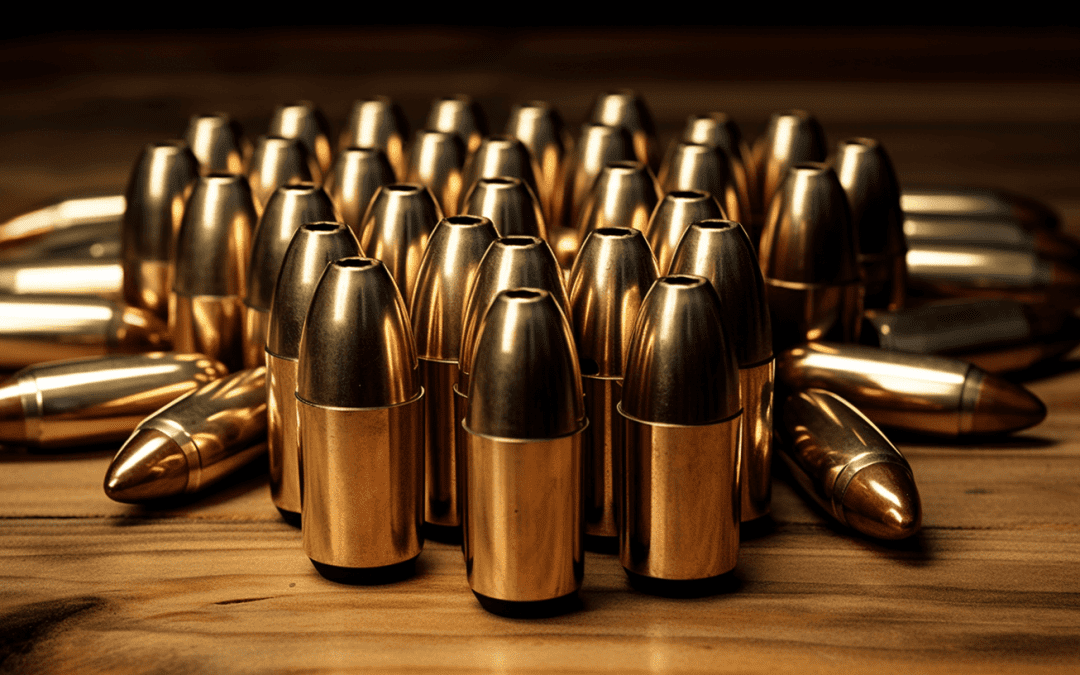Are Hollow Points Best for Self Defense?
When it comes to self-defense, the choice of ammunition is crucial. There is an ongoing debate on whether hollow points are the best option for this purpose. As someone knowledgeable in this area, I’d like to share some insights on this topic. Hollow points, also known as jacketed hollow points (JHP), are designed to deform upon impact, creating a larger wound channel and dissipating more energy compared to full metal jacket (FMJ) rounds. This expansion property makes them ideal for stopping potential threats quickly and effectively.
In a self-defense scenario, over-penetration is a major concern. JHP rounds address this issue by reducing the likelihood of the bullet passing completely through the target and causing unintended harm to others in the vicinity. As they expand upon impact with the target, the energy transfer helps incapacitate the threat and reduces the chance of further injury. In comparison, FMJ rounds often penetrate more deeply, posing a higher risk of collateral damage.
With a better balance of expansion and penetration, hollow points offer a higher wounding capacity, which is essential in self-defense situations. While no ammunition can guarantee absolute success, the use of JHP rounds has been widely recognized as a more effective choice compared to their FMJ counterparts when it comes to self-defense purposes. The decision ultimately depends on personal preference, weapon type, and other factors, but the advantages provided by hollow points cannot be overlooked.
Hollow Point Bullets
I believe that hollow point bullets are well-suited for self-defense situations. One of the primary reasons for this is their design, which allows them to expand upon impact. This expansion is essential in reducing the risk of over-penetration, which could potentially lead to collateral damage or unintended injuries. Jacketed hollow point (JHP) bullets are specifically designed to minimize over-penetration in self-defense situations.
From my experience, using hollow point rounds in a home defense or concealed carry gun makes me feel more confident, tactically and legally. They provide a reliable stopping power, ensuring that the threat is neutralized with minimal risk to anyone else in the vicinity. When considering the best ammo for self-defense, I find that hollow point rounds are often recommended by experts due to their performance and safety features.
In addition to self-defense, hollow-point bullets have other applications as well. Some types of hollow-points are used for target shooting because they offer greater accuracy than traditional conical bullets. The large meplat of hollow point bullets can increase accuracy, providing an advantage during competitions or practice sessions.
Moreover, there is a range of best 9mm ammo options available in the market, which include both affordable practice rounds and high-performing hollow point rounds for self-defense. With various choices of grain weights and manufacturers, I can find hollow point bullets that best suit my needs and preferences.
In conclusion, I consider hollow point bullets to be a practical and effective choice for self-defense situations. They offer increased stopping power, accuracy, and safety compared to other types of ammunition. The variety of hollow-point bullets available ensures that I can find the best option for my specific needs, whether it be for self-defense, target shooting, or other purposes.
Hollow Point Ammunition and Ammo
When considering self-defense ammunition, one highly recommended option is hollow point ammo. As someone who has researched and used various types of ammunition, I can confidently say that hollow point rounds provide several advantages in self-defense situations compared to their full metal jacket (FMJ) counterpart.
Firstly, hollow point ammo is designed for rapid expansion upon impact. When the bullet makes contact with a target, it expands, creating a larger wound channel and increased stopping power. In contrast, FMJ ammunition is more likely to over-penetrate, which can potentially cause harm to others behind the intended target. In this respect, I believe hollow points prove to be a more responsible choice for self-defense situations.
Moreover, using hollow points reduces the risk of ricochets and can even minimize potential legal concerns. Since hollow point bullets transfer more energy into the target and are less likely to over-penetrate, there is a reduced risk of them bouncing off surfaces and causing collateral damage. Additionally, in cases where you have to use your firearm in self-defense, the choice of hollow point ammunition can demonstrate your intention to minimize harm to innocent bystanders.
On the other hand, many argue that hollow point ammo is more expensive than FMJ rounds. While this is true, I firmly believe that the added investment is worth it for the increased safety and effectiveness provided in self-defense situations.
In summary, my experience and research have led me to conclude that hollow point ammunition is an excellent choice for self-defense purposes. With its rapid expansion, increased stopping power, and reduced risk of over-penetration and ricochets, I trust that hollow points are a valuable component of a well-rounded self-defense strategy.
Self-Defense and Personal Protection
When it comes to self-defense and personal protection, finding the right ammunition is essential. I believe that hollow points are a strong contender in this regard. They are specifically designed for self-defense situations and offer many advantages over other types of ammo.
Hollow point bullets, such as jacketed hollow points (JHP), rapidly expand upon hitting their target, reducing the risk of over-penetration. This is a crucial factor in choosing ammo for self-defense or carry guns, as over-penetration can endanger innocent bystanders or even members of your household.
Additionally, hollow points are less likely to pass through walls, providing an extra layer of safety in home defense situations. This feature makes them a particularly good choice for personal protection in residential areas, where the potential for collateral damage or injury is high.
I’ve noticed that hollow points generally require fewer rounds to incapacitate an assailant, leading to more efficient and safer outcomes in self-defense situations. The excellent performance of hollow points has been recognized in various testing methodologies, which take into account factors such as penetration depths and wound cavity size.
In my experience, many self-defense handgun experts recommend hollow points as the best choice for optimal performance in self-defense situations. While there might be other options on the market, hollow points have a proven track record and align with the primary goal of personal protection – to stop a threat as quickly and effectively as possible.
All in all, I’d say that hollow points constitute a reliable and efficient choice for self-defense and personal protection ammo. Their characteristics, such as rapid expansion and minimized over-penetration, make them well-suited for various self-defense situations, including home defense and concealed carry.
Hollow Points and Innocent Bystanders
When considering self-defense ammunition, one of my primary concerns is minimizing collateral damage, especially to innocent bystanders. Hollow points provide a distinct advantage in this area compared to traditional full metal jacket (FMJ) bullets.
A significant factor in the effectiveness of hollow points is their ability to expand upon impact, which increases the surface area of the bullet and dissipates its energy through the target. This expansion typically results in controlled penetration, reducing the likelihood of over-penetration and minimizing the risk of hitting an unintended target behind the assailant. In contrast, FMJ bullets tend to retain their shape and can penetrate multiple layers, increasing the risk of harming innocent bystanders.
Another aspect that contributes to the safety of hollow points in self-defense situations is their heavier bullet weight. Heavier bullets tend to transfer more energy to the target, further decreasing the likelihood of over-penetration and reducing the risk of collateral damage. Many law enforcement agencies, such as the Illinois State Police, have adopted high-tech hollow point rounds precisely because of these attributes.
In addition, hollow points typically deliver more significant stopping power than their FMJ counterparts, making them a more effective self-defense option. A bullet that stops an attacker quickly reduces the probability of that attacker carrying out further harm to others or escaping to threaten other innocent bystanders.
While hollow points come with advantages for self-defense situations, it’s essential to remember that the effectiveness of any ammunition often relies on the shooter’s ability to accurately place shots in a high-stress scenario. In the end, I believe that hollow points provide a better option for minimizing collateral damage and ensuring the safety of innocent bystanders during a self-defense situation.
Effect on Soft Tissue
When discussing the impact of hollow points on soft tissue, it’s important to understand the design and purpose of these rounds. Hollow points are specifically designed to expand upon impact, creating a larger wound channel and causing more damage to the target. This great expansion is one of the key factors that makes hollow points a popular choice for self-defense.
In the human body, tissue is remarkably elastic, so when a full metal jacket (FMJ) round impacts soft tissue, the bullet tends to pass through without causing significant damage. On the other hand, when a hollow point bullet impacts soft tissue, it expands and creates a much larger wound channel. This expansion transfers more energy to the target and significantly increases the odds of stopping a threat.
When it comes to self-defense situations, it’s crucial to incapacitate an attacker as quickly as possible. The larger wound channel created by hollow points is more likely to result in rapid incapacitation, reducing the time and opportunity for an attacker to continue posing a threat. This is especially important in a high-stress situation, where every second counts.
I want to emphasize the importance of using ammunition designed for self-defense, such as hollow points, to maximize the chance of stopping a threat and minimizing the risk of collateral damage. The significant difference in the effect on soft tissue between hollow points and FMJ rounds highlights the advantages of using hollow points for self-defense purposes.
Penetration and Stopping Power
When I consider the effectiveness of hollow points in a self-defense situation, it’s crucial to understand their penetration and stopping power. Hollow points are engineered to rapidly expand upon impact, transferring more kinetic energy to the target and creating larger wound channels. This capability makes them a better option for incapacitating an attacker, or a “bad guy,” as quickly as possible.
In terms of penetration, hollow points are less likely to over-penetrate compared to full-metal jacket (FMJ) rounds, which are known to sometimes pass through the target and cause collateral damage. Instead, hollow points concentrate their energy within the intended target, increasing the chances of hitting vital organs and ensuring a more effective physiological stop. This is an essential factor in a self-defense situation, as it minimizes the risk to innocent bystanders.
By transferring more kinetic energy to the target, hollow points inflict more severe damage that can incapacitate the attacker faster. When a hollow point bullet expands, its increased surface area creates a larger wound channel, disrupting more tissue and increasing the chance of striking a vital organ. With the right placement, a single well-aimed hollow point round can effectively end the threat to your safety.
However, it’s important to note that the stopping power largely depends on the caliber and load of the ammunition used. For instance, a .45 Auto 230-grain hollow point bullet is considered by many as the ultimate stopper due to its impressive track record in terms of penetration and energy transfer to the bad guy. It’s essential to select the proper load for your self-defense firearm to ensure the best possible stopping power.
In conclusion, I believe that hollow points do provide the best penetration and stopping power for self-defense situations. Their design allows for increased energy transfer and reduced over-penetration, making them ideal for quickly incapacitating an attacker and protecting yourself while minimizing the risk of harm to others.
Comparison with Other Ammunition Types
In my research on different ammunition types, I found that there are several options available to gun users, and it’s important to be aware of their advantages and disadvantages. Notably, hollow points and full metal jacket (FMJ) rounds are the most commonly discussed when it comes to self-defense.
Hollow point ammunition, or JHP ammo, is a popular choice for self-defense because of its expansion upon impact. When hitting a target, these bullets are designed to expand and create a larger wound channel, making it more effective in stopping potential threats. However, one downside of hollow points is their slightly higher price compared to other types of ammunition.
On the other hand, FMJ ammo is intended for target practice and general use. These bullets are made up of a lead core covered by a metal jacket, which allows for better penetration through various materials. FMJ rounds are often cheaper than hollow points, making them attractive for range shooting. However, due to their potential for over-penetration, they are generally not recommended for self-defense situations.
Another type of bullet design worthy of mention is the cast lead bullet. These are typically less expensive and simpler in their design than hollow points or FMJ bullets. However, because they lack a metal jacket, lead bullets can deposit more residue in the firearm barrel, leading to increased maintenance needs.
Additionally, when considering ammunition for self-defense, it’s essential to think about the caliber. Most commonly, we find 9mm rounds, which have become increasingly popular due to their effectiveness and availability. Many 9mm ammunition options include both hollow point and FMJ types, offering flexibility for gun users to choose the best type based on their needs.
In summary, the choice of ammunition type depends on factors such as self-defense requirements, budget, and personal preferences. Hollow points, FMJ rounds, and cast lead bullets have different characteristics that cater to various needs, and it’s essential to choose the one that matches your situation the most effectively.
Popular Hollow Point Brands
When it comes to hollow point ammunition for self-defense, I have researched and found several popular brands that stand out due to their performance and reliability. In this section, I’ll briefly discuss some of these well-known brands, including Speer Gold Dot, Hornady Critical Defense, Remington UMC, Sig V-Crown, and Lucky Gunner.
Speer Gold Dot is a widely recognized brand in the world of self-defense ammunition. Their jacketed hollow point (JHP) rounds are known for their reliable expansion and consistent performance when it matters most. Gold Dot has become a gold standard for law enforcement agencies and concealed carry users alike.
Hornady Critical Defense is another top choice for self-defense ammunition. Their rounds feature a patented Flex Tip design, which helps to ensure consistent expansion upon impact and reduce the risk of over-penetration. Hornady Critical Defense is well-regarded for its reliable performance in various challenging conditions.
Moving on to Remington UMC, I found that their line of hollow point ammunition is both affordable and reliable. This brand has been a longstanding choice for self-defense and range training, offering a balance between cost and performance for those looking to stock up without breaking the bank.
Sig V-Crown is notable for their high-quality hollow point ammunition, particularly in the 9mm category. Their rounds are designed for optimal expansion and weight retention, which can result in better stopping power and reduced risk of over-penetration. Sig V-Crown has gained a reputation for delivering reliable performance in self-defense situations.
Lastly, Lucky Gunner is an online ammunition retailer that offers a wide range of self-defense and target shooting ammo, including various hollow point options. Popular brands like Speer Gold Dot and Hornady Critical Defense can often be found in their inventory. While not a manufacturer itself, Lucky Gunner is a valuable resource for those seeking the best self-defense ammunition.
In conclusion, there are numerous hollow point brands on the market that cater to different needs and preferences. The ones I covered above have proven to be reliable and effective choices for self-defense situations. It’s essential to choose the right ammunition for your specific firearm and training requirements.
Home Defense Applications
As someone who is concerned about personal safety, I’ve always been curious about the effectiveness of various types of ammunition for home defense. One type that has drawn my attention is hollow points. Hollow points are a type of bullet with a pitted or “hollow” tip, designed to expand upon entering a target, ensuring that all of the bullet’s energy is deposited in the target. This process is commonly referred to as “mushrooming” and results in more catastrophic damage to a target1.
In terms of home defense, hollow points are considered an excellent option. One reason for this is that they’re less likely to pass through the target or walls and put my family in danger2. Additionally, the expanding nature of hollow points usually results in more internal damage to an assailant, meaning fewer rounds may be required to bring them down3. This can lead to better outcomes for everyone involved.
However, it’s important to note that not all hollow points are created equally4. Different manufacturers and designs can impact the overall effectiveness of a hollow point bullet, so it’s essential for me to do my research and choose the best option for my personal defense needs.
To summarize, using hollow point rounds in my home defense or concealed carry gun seems to be a wise choice, both tactically and legally1. The benefits include minimized risks to my family, greater stopping power, and adherence to the unwritten rule for choosing ammunition for self-defense. Of course, it’s always important for me to practice responsible gun ownership and familiarize myself with the weapon and ammunition I choose to rely on for home defense.
Footnotes
Law Enforcement and Hollow Points
When it comes to self-defense, law enforcement agencies in the United States largely rely on hollow point ammunition. This is primarily because hollow points are designed for controlled penetration, reducing the risk of over-penetration and collateral damage. As a result, many police departments and federal agencies have adopted these types of rounds for their duty weapons.
In my experience, some of the top hollow point rounds used by law enforcement include the Speer Gold Dot, Federal HST, Hornady Critical Duty, Winchester Ranger T, and Remington Golden Saber. These rounds have been rigorously tested and proven to provide excellent performance for self-defense situations.
As a responsible gun owner, it’s crucial to understand the importance of using the right ammunition for self-defense purposes. Hollow point bullets offer significant advantages when it comes to stopping threats quickly, while also minimizing the potential for unintended harm.
When choosing self-defense ammunition, I recommend looking for rounds that have been designed specifically for controlled expansion. This ensures that the bullet will effectively transfer its energy to the target upon impact, rather than passing through and potentially causing harm elsewhere.
In summary, law enforcement agencies throughout the United States have recognized the benefits of using hollow point ammunition for self-defense, resulting in widespread adoption of these rounds. As a knowledgeable and responsible gun owner, it’s important to understand the advantages of hollow points and consider their use for personal self-defense as well.
Range Use and Target Practice
As an experienced gun enthusiast, I can tell you that there is a clear distinction between range ammo and target ammo. For those who are new to firearms and ammunition, it is important to understand the difference between the two.
Target ammunition is specifically designed for practice at the range or target shooting. It typically has a full metal jacket, which means the bullet is encased in a hard metal, such as copper. This type of ammo is often much cheaper than hollow point ammunition, making it more cost-effective for regular practice. During my time at the range, I have found that target ammunition is generally reliable and consistent, allowing me to refine my shooting skills and enhance my accuracy.
Range ammo, on the other hand, encompasses a broader range of bullet types, including full metal jacket, frangible, and even some hollow points. This type of ammo can be used for both target practice and training drills. Personally, I think it’s a good idea to also practice with some of your self-defense or concealed carry ammunition, as it can help you gain familiarity with how your chosen hollow point rounds perform in your firearm.
Now, let’s discuss the relevance of hollow points in self-defense situations. Hollow point ammunition is specifically designed to expand upon impact, which can result in greater stopping power and decreased risk of over-penetration. This makes hollow points an ideal choice for self-defense purposes, as they are more likely to incapacitate an attacker quickly and efficiently.
As I mentioned earlier, it’s important to practice with both target ammo and the hollow point ammo you plan to use for self-defense. This allows you to become accustomed to the different performance characteristics, recoil, and accuracy of each type of round, ensuring that you are well-prepared should you ever need to rely on your firearm for personal protection.
So, whether you are heading to the range for some casual target shooting or honing your self-defense skills, it is crucial to understand the differences between target ammunition, range ammo, and hollow point rounds. By practicing with a variety of ammo types, you can build confidence in your shooting abilities and make an informed decision when choosing the best ammunition for your specific needs.
Heavier Clothing and Barrier Penetration
When it comes to self-defense, I believe that hollow points are an excellent choice for a number of reasons. One consideration to keep in mind is the potential for an assailant to be wearing heavy clothing.
In situations where an attacker is wearing heavy clothing, there’s a possibility that their garments may clog the hollow point bullet upon impact. This could potentially hinder the expansion of the bullet, which is a key factor in the effectiveness of hollow points for self-defense purposes. However, it’s important to note that not all hollow points will be affected in the same way, as some are designed to remain effective even with this barrier.
Another relevant aspect is the performance of hollow points in comparison to full metal jacket (FMJ) rounds when it comes to barrier penetration. FMJ rounds, in contrast with hollow points, are known to penetrate barriers more effectively. This advantage could be useful in certain self-defense scenarios where you might need to shoot through a barrier to neutralize a threat. But it’s essential to weigh this against the risks of over-penetration, which is a more common problem with FMJ rounds.
In conclusion, despite the potential limitations regarding heavy clothing and barrier penetration, I still believe that hollow points are a strong choice for self-defense. Their ability to expand upon impact increases the likelihood of incapacitating an attacker, ultimately providing a more effective and safer solution for personal protection.
Bullet Weight and Muzzle Velocity
When considering self-defense ammunition, it’s crucial to understand the importance of bullet weight and muzzle velocity. Bullet weight refers to the mass of the projectile, usually measured in grains. Muzzle velocity is the speed at which the bullet leaves the muzzle of the firearm, typically measured in feet per second (fps).
I believe that finding the right combination of bullet weight and muzzle velocity is essential for effective self-defense. Lighter bullets can be pushed at higher speeds, while heavier bullets tend to penetrate more deeply. For example, 9mm Jacketed Hollow Point (JHP) is a common self-defense round, and its performance varies depending on the weight and muzzle velocity.
When it comes to self-defense, I think a balance between penetration and expansion should be sought. Too much penetration can over-penetrate the target, risking harm to bystanders or property, while inadequate penetration might not reach vital organs, reducing the bullet’s effectiveness. Selecting a bullet with a proven track record is crucial, such as the Speer Gold Dot, which has been around for a long time and consistently delivers in actual self-defense scenarios.
Muzzle velocity plays a significant role in a bullet’s ability to expand and perform optimally. Most shooters opt for standard velocity hollow point ammunition for self-defense, as it generally provides enough kinetic energy to be lethal with enough muzzle velocity to cause the bullet to expand reliably. It’s worth noting that some of the most powerful cartridges available might not always be the best choice for self-defense due to excessive penetration or recoil, possibly limiting the shooter’s ability to make effective follow-up shots.
In conclusion, understanding the role of bullet weight and muzzle velocity in self-defense ammunition is essential. A balance between expansion and penetration should be sought to maximize the bullet’s effectiveness while minimizing the risk of collateral damage. Always choose a proven hollow point bullet design and remember that shot placement is just as critical in determining a successful self-defense outcome.
Legal and Ethical Considerations
When discussing the use of hollow point ammunition for self-defense, it’s essential to consider the legal and ethical aspects of their use. I am aware that, in general, using hollow point rounds in your home defense or concealed carry gun is considered a wise choice, both tactically and legally.
However, there are situations where the legality of using hollow point bullets might be questioned. It’s important to note that the Hague Convention prohibits the use of expanding bullets in international armed conflicts. The convolution is focused predominantly on military use, which is not directly applicable to civilian self-defense scenarios. Nonetheless, it’s worth being mindful of the international context in which certain types of ammunition may be discouraged or prohibited.
While the Geneva Convention doesn’t specifically address hollow point ammunition, it does emphasize the importance of limiting unnecessary suffering in armed conflicts. This reasoning may influence the perception of hollow point bullets in certain situations, as they are specifically designed to expand upon impact and cause greater damage to a target.
In a civilian self-defense context, my priority is to protect my life and the lives of my loved ones from immediate threats. Hollow point ammunition can help minimize the likelihood of over-penetration and unintended harm to bystanders, which is an ethical consideration given the potentially deadly consequences of their use.
Furthermore, being knowledgeable about my local and national laws pertaining to the possession and usage of hollow point ammunition is crucial. As a responsible gun owner, it’s my duty to stay informed about any regulations or restrictions on the types of ammunition I can legally use.
In conclusion, while there may be legal and ethical considerations surrounding the use of hollow point ammunition, I believe that in a self-defense scenario, it is essential to make informed decisions based on the specific situation and the potential risks involved. Being aware of international conventions and local laws not only ensures adherence to regulations, but it also contributes to the responsible use of firearms in self-defense.
Purchasing Hollow Point Rounds
When it comes to self-defense, I believe that hollow point rounds are an excellent option. They provide several advantages over traditional full metal jacket (FMJ) ammunition, and when used appropriately, can offer superior stopping power and minimize collateral damage.
One of the best places to purchase hollow point rounds would be at a local gun store. In my experience, they often provide knowledgeable staff members who can answer any questions I have about this type of ammunition, as well as recommend which brands and calibers are most suitable for my needs. I also appreciate that local gun stores typically stock a wide variety of hollow point options, ensuring that I can find the perfect round for my specific firearm.
As a responsible gun owner, it’s important for me to consider the safety of those around me when choosing my ammunition. Hollow point rounds have a significant advantage in this area, as they are specifically designed to expand upon impact. This expansion reduces the chance of over-penetration and minimizes the risk of unintentional injuries to bystanders.
Additionally, the use of hollow point ammunition offers greater stopping power in a self-defense situation. The expansion of the bullet upon impact creates larger wound channels, which can effectively incapacitate an attacker. This allows me to feel confident and more secure in my ability to protect myself and my loved ones.
In conclusion, when considering the various types of ammunition available for self-defense purposes, I find that hollow point rounds are an outstanding choice. By purchasing these rounds at my local gun store, I know that I’m making a well-informed decision for both my personal safety and that of those around me.
Frequently Asked Questions
What makes hollow points effective for self-defense?
Hollow point bullets are designed with a hollowed out tip, which allows for controlled expansion upon impact. This expansion leads to a larger diameter and higher transfer of energy, increasing their stopping power. I find that hollow points are effective for self-defense because they tend to incapacitate an assailant more quickly, reducing the risk of multiple shots being necessary.
How do hollow points compare to full metal jacket bullets?
Full metal jacket (FMJ) bullets are coated in a harder shell, and they do not expand upon impact. These types of bullets can more easily penetrate multiple layers, potentially posing a risk of over-penetration in a self-defense situation. In my experience, hollow points are a better choice for self-defense due to their controlled expansion and higher stopping power.
What are the legalities surrounding hollow points for self-defense?
Laws regarding hollow point ammunition can vary by jurisdiction. In some places, such as New Jersey, hollow points are illegal. It’s essential to be aware of your local laws and regulations when choosing hollow points for self-defense. I recommend consulting with local experts or law enforcement if you have any questions.
What are the advantages of hollow points for various calibers?
Different calibers have unique characteristics, and hollow points can enhance the performance of many calibers for self-defense purposes. The controlled expansion offered by hollow points translates to higher stopping power and less risk of over-penetration across various calibers, making them a popular choice regardless of the specific firearm used.
Do hollow point bullets cause greater tissue damage?
Because hollow point bullets expand upon impact, they tend to cause greater tissue damage compared to FMJ bullets. This can be beneficial in a self-defense situation, as it increases the likelihood of incapacitating an assailant quickly. It is important to weigh this factor against other considerations, such as the potential risk of over-penetration.
Is there a suitable alternative to hollow points for self-defense?
While hollow points are widely considered the optimal choice for self-defense, there are some alternatives to consider. For example, soft point bullets offer some expansion upon impact, although not as controlled as hollow points. In scenarios where hollow points are not legal or available, soft point bullets might be a suitable option, though I still recommend hollow points as my first choice for self-defense purposes.








